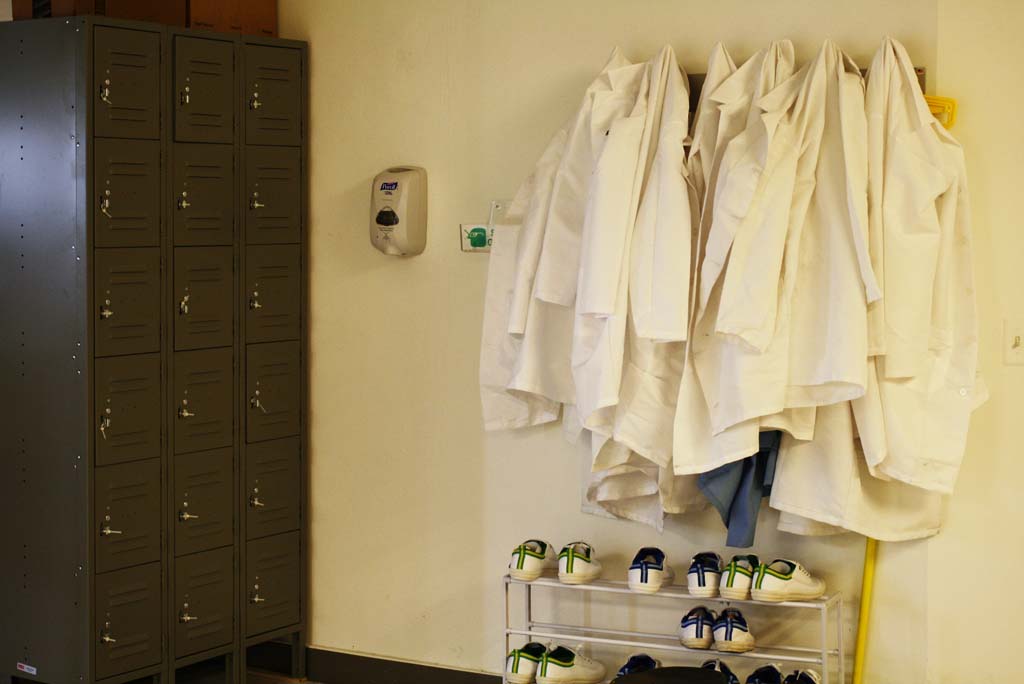Suneris, the biotech company founded by a couple of NYU Poly undergrads, found its new research, manufacturing and office space on Craigslist.
It’s a former woodshop on the second floor of a commercial building on the north end of Sunset Park. The small team did most of the work to rehab the space themselves, turning it from a place for cutting wood into a certified production facility for medical products.
CEO Joe Landolina and his VP of engineering, Omar Ahmad, both said that, looking back, they might not have undertaken the rehab process if they had realized how much work it was going to be.

Most of the Suneris team, with their 50L Reactor. From left to right: Zen Ahmed (Business Development), Edna Seymour (Veterinary Development), Joe Landolina (Cofounder and CEO), Omar Ahmad (Engineering) and Hassaan Ahmad (Quality and Regulatory). (Photo by Brady Dale)
Suneris has been in the space since January, after working for several months out of a very small space on Long Island.
Landolina said he checked out the various new biotech incubators and accelerators opening up around New York, but couldn’t find the right fit. Some didn’t have enough room or some had a minimum of too much room.
Landolina is the inventor of the company’s core product, Veti-Gel, which we have covered before. In short, the gel is a combination of plant polymers that, when applied to an open wound, stops bleeding instantly and begins the process of sealing the wound over. Landolina will be speaking at his second TED event in October, TED Global, as we previously reported.

The office space, showing staff in vet outreach, business development and regulatory affairs. (Photo by Brady Dale)
Landolina explained a little more to us about how he created Veti-Gel. He said his grandfather retired from Hoffmann-La Roche after many years of doing chemistry work for them. He then began making wine.
So, Landolina grew up playing around with chemistry equipment, and right before he started college he found that by combining two polymers he got a sort of gel that he thought might work as a wound treatment.
He found his cofounder Isaac Miller after entering his product into a pitch competition at NYU. Now graduated, Landolina and Miller are looking forward to launching their product to veterinarians by January. The company already has a network of 1,600 vets who will likely received samples for beta testing later this year.
Revenue from veterinary sales will be used to fund the clinical trials required by the FDA, Landolina said, with the goal of winning approval for Veti-Gel’s use in surgery on humans.
Landolina told us that there is some chance the gel will be approved for topical human use as a military application sooner than that, but that’s all he could say on the matter.
The research and development space will be used for optimizing the current product and developing new ones, Landolina told us.
We can’t show photos of the manufacturing space, Landolina said, but they are built to standards for human applications. That way, the company wouldn’t have to retrofit the facility later, he added.
One tricky realization about Veti-Gel is that it has to be made so that the product can be manufactured clean from the start. Landolina said that most similar products are manufactured in an imperfectly sterile environment, because the finished package can just be irradiated. That doesn’t work for Veti-Gel, however, because of the nature of the substance. That’s why it must be made in a sterile space.
The team of ten is expanding by two soon. It had 300 applications for its summer internship program, and accepted three. Two of those students will begin working on the Suneris staff soon. The company also has two more interns starting in the fall, out of a pool of 100 applicants. Within the year, Suneris may bring on one person full-time in sales and one in manufacturing. Almost the entire team lives in Brooklyn, though only Ahmad is a Brooklyn native.
The team is in the process of securing its Series A now, following a friends and family seed round.
Before you go...
Please consider supporting Technical.ly to keep our independent journalism strong. Unlike most business-focused media outlets, we don’t have a paywall. Instead, we count on your personal and organizational support.
Join our growing Slack community
Join 5,000 tech professionals and entrepreneurs in our community Slack today!



